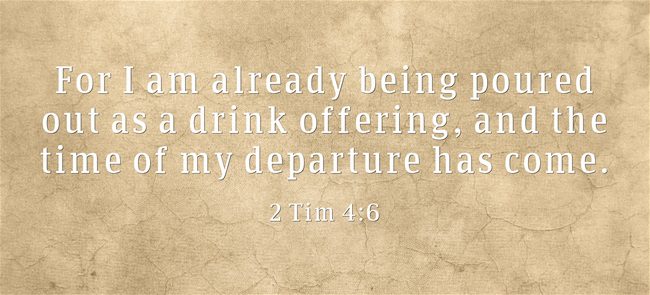Does the Bible tell us how the Apostle Paul died? If not, what do church and secular historians say?
The Pouring out of Paul
Near the very end of Paul’s life he wrote some very heartbreaking statements. Apparently, just prior to his execution, Paul wrote “For I am already being poured out as a drink offering, and the time of my departure has come. I have fought the good fight, I have finished the race, I have kept the faith. Henceforth there is laid up for me the crown of righteousness, which the Lord, the righteous judge, will award to me on that Day, and not only to me but also to all who have loved his appearing” (2nd Tim 4:6-8). Just like the Old Testament drink offerings, Paul poured out his life for Christ till the very end. Paul must have still felt hurt because he said “At my first defense no one came to stand by me, but all deserted me. May it not be charged against them” (2nd Tim 4:16). This is so much like Christ on the cross where Jesus said “Forgive them Father for they know not what they do” (Luke 23:24). Paul was not really left alone though as he writes “But the Lord stood by me and strengthened me” (2nd Tim 4:17a). Paul knew “The Lord will rescue me from every evil deed and bring me safely into his heavenly kingdom” (2nd Tim 4:18). If Paul believed his own teachings, then he is now “present with the Lord” (2nd Cor 5:8).
How did Paul Die?
Did Paul die of natural causes or are there more reasons to believe that Paul was beheaded because in Rome, being beheaded was not that unusual for condemned prisoners. The Bible never states the method of Paul’s death; only it certainty of its coming. We can look at church historians as well as contemporary historians of Paul’s time. One source, The People’s Chronology, states that Paul was beheaded with a sword near Rome roughly in AD 67 and tradition holds that Paul was beheaded on the Ostian Road which lies just outside of Rome. Paul had to be beheaded because he was a Roman citizen, and Roman citizens were never crucified.
One of Nero’s favorite things to do was to enslave, imprison, torture, and even light up Christians to use as human torches to light up his parties. Christianity, by this point, was already illegal and couldn’t be considered part of a Jewish sect anymore. The Romans would not allow any other gods before Caesar while Christians would not put any other gods before God! Dr. William Smith, writing in Smith’s Bible Dictionary, believes that both Peter and Paul may have been martyred at nearly the same time, because they were in Rome at the same time. Peter was being crucified upside down and like John the Baptist, Paul was beheaded. It is not that important to know how Paul was martyred or when he was killed but to know why. Paul warned that “all who desire to live a godly life in Christ Jesus will be persecuted, while evil people and impostors will go on from bad to worse, deceiving and being deceived” (2nd Tim 3:12-13). Paul had been “persecuted, but not abandoned; struck down, but not destroyed” (2nd Cor 4:9) but he did pour out his life for Christ, even when all others abandoned him; all but the Lord that is.
Paul’s Heart
Paul’s heart was so tender for the lost that he once wrote that “I could wish that I myself were accursed and cut off from Christ for the sake of my brothers, my kinsmen according to the flesh” (Rom 9:3) saying it was “in order somehow to make my fellow Jews jealous, and thus save some of them” (Rom 11:14). Paul was willing to pour out his life whether it meant execution or not because this apostle was “with far greater labors, far more imprisonments, with countless beatings, and often near death. Five times I received at the hands of the Jews the forty lashes less one. Three times I was beaten with rods. Once I was stoned. Three times I was shipwrecked; a night and a day I was adrift at sea” (2nd Cor 11:23-25) and that’s not the half of it. He was constantly “in danger from rivers, danger from robbers, danger from my own people, danger from Gentiles, danger in the city, danger in the wilderness, danger at sea, danger from false brothers; in toil and hardship, through many a sleepless night, in hunger and thirst, often without food, in cold and exposure” (2nd Cor 11:26-27).
Conclusion
The Apostle Paul was a unique saint of God in the early church. He was the church’s first and perhaps greatest missionary ever. He was willing to die for his beliefs and was relentless in taking and spreading the gospel among the Gentiles and throughout the Roman Empire. He poured himself out just like the Old Testament drink offerings and there was nothing left to give; no other churches to plant; no other guard’s to witnesses to; he was now present with the Lord.
Article by Jack Wellman
Jack Wellman is Pastor of the Mulvane Brethren church in Mulvane Kansas. Jack is also the Senior Writer at What Christians Want To Know whose mission is to equip, encourage, and energize Christians and to address questions about the believer’s daily walk with God and the Bible. You can follow Jack on Google Plus or check out his book Teaching Children the Gospel available on Amazon.















